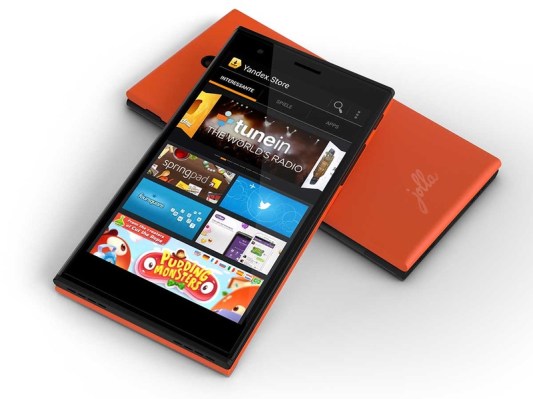Finnish phone startup Jolla, which is on a mission to offer more choice in the smartphone space by building its own smartphone hardware and with a MeeGo-based open source smartphone OS called Sailfish, is banding together with Yandex, Russia’s homegrown Google, to power the app store on its forthcoming smartphone.
Jolla’s Sailfish OS has been designed to be compatible with Android, as well as supporting its own native set of apps — via the Sailfish SDK — but being as it’s running its own OS rather than Google’s platform it was never going to have access to Google’s Play Store. In any case, if you’re trying to disrupt Google’s dominance of smartphones, the last thing you’d want to do is be another node for Mountain View to pull in clicks.
Jolla said today it has selected the Yandex.Store, an alternative Android app store that currently contains around 85,000 apps, in 17 categories, for pre-loading on its smartphone. Usual app suspects on offer in the store include Facebook, Twitter, Foursquare, Skype, Viber and WeChat, according to Yandex, along with various games, productivity apps and music apps.
“Jolla’s strategy is always to work with the most applicable service partners in specific markets and create long-term strategic partnerships,” said Sami Pienimaki, co-founder of Jolla, in a statement. “We analysed a number of alternative Android app stores to use for our first markets in Europe, and quickly found out that what Yandex offered was very competitive and that they were very interested in developing their app store together with us for their future needs and for the needs of Sailfish customers.”
With Google’s Play store passing one million apps this July, there’s no doubting its volume dominance. But 85,000 apps isn’t a bad amount of apps for a new platform. Jolla will also be hoping to have some of its own Sailfish apps to add to that pool when it finally gets its phone to market.
Jolla’s handset has most recently been touted as coming in time for Chinese New Year — so Q1 2014 — with the startup running a pre-sales campaign that saw up to 50,000 units reserved by future owners, who were required to put down a partial payment to reserve a phone.
